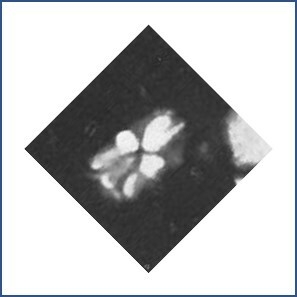Sphenolithus dissimilis
Set number: 882
-
1
-
2
-
3
-
4
10µm
Set number: 883
-
1
-
2
-
3
-
4
10µm
Set number: 884
-
1
-
2
-
3
-
4
-
5
-
6
10µm
Sphenolithus dissimilis Bukry & Percival, 1971
The precise age of the holotype sample was obtained from the chart provided by Bramlette & Wilcoxon (1967).
Elongated species of Sphenolithus Deflandre in Grassé (1952) having a clustered apical spine resembles a bouquet of flower at 45° [its segments radiating outward distally]. The apical cycle shows maximum birefringence at 45° but extinct (dim) at 0°.
The height of the elongated proximal cycle is about equal to the height of the lateral cycle. The segments of the proximal cycle aligned longitudinally.
The cylindrical proximal cycle has irregular quadrilateral shape segments in the axial section. The inner ends of these segments are joined most of their second-longest side along the longitudinal axis of the species, thus creating a very shallow conical proximal cavity.
The opposite side of the hallow cylindrical proximal cycle is better seen at 45° and display an axial c-axis.
Sphenolithus dissimilis differs from Sphenolithus disbelemnos Fornaciari & Rio, 1996 and Sphenolithus compactus Backman, 1980 by having almost equal heights proximal and lateral cycles. In Sphenolithus disbelemnos and Sphenolithus compactus, the height of the proximal cycle is distinctly greater than the height of the lateral cycle. Sphenolithus dissimilis further distinguished from Sphenolithus compactus by being larger.
Sphenolithus dissimilis is distinguished from Sphenolithus quasibelemnos Varol, in prep. by having a bouquet shape clustered apical cycle instead of a biconical apical spine. Moreover, Sphenolithus disbelemnos has a cylindrical proximal cycle whereas Sphenolithus quasibelemnos has a frustum shape proximal cycle.
Backman, J. 1980. Miocene-Pliocene nannofossils and sedimentation rates in the Hatton-Rockall Basin, NE Atlantic Ocean. Stockholm Contributions in Geology 36: 1-91.
Bramlette, M. N. & Wilcoxon, J. A. 1967. Middle Tertiary calcareous nannoplankton of the Cipero section, Trinidad, W.I. Tulane Studies in Geology and Paleontology 5: 93-131.
Bukry, D. & Percival, S. F. 1971. New Tertiary calcareous nannofossils. Tulane Studies in Geology and Paleontology 8: 123-146.
Deflandre, G. 1952. Classe des Coccolithophoridés. (Coccolithophoridae. Lohmann, 1902). In: Grassé, P. P. (Ed.), Traité de Zoologie. Masson, Paris. 439-470.
Fornaciari, E., Rio, D., 1996. Latest Oligocene to early Middle Miocene quantitative calcareous nannofossil biostratigraphy in the Mediterranean region. Micropaleontology 42(1), 1-37
